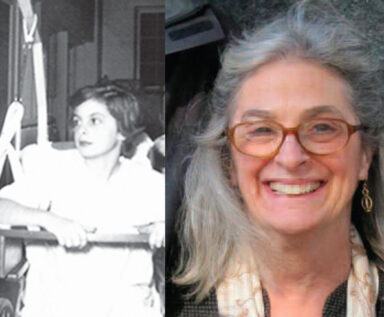Polio: A Patient’s Perspective
- By Trudie Mitschang

AN ACCLAIMED POET, essayist and author of five books (with a sixth on the way), Karen Chase is both an imaginative narrator and compelling heroine in her illuminating memoir Polio Boulevard. In it, Chase recounts the story of her childhood bout with polio, and charts her complicated and often painful road to recovery.
Chase’s upbringing in Westchester County, N.Y., was as idyllic as it was ordinary. As an active and creative fifth grader, she loved helping her older brother with his paper route, doting on her new baby sister and tooling around town on her beloved bike. It was on just such an ordinary day that mysterious leg pains signaled the presence of the insidious disease that would abort her carefree childhood. “I was walking home from school for lunch, kicking a stone down the road, and my legs began to hurt. After a peanut butter and jelly sandwich and glass of cold milk, I said, ‘Mom, I can’t go back to school today,’” recalls Chase. “My neck got stiff, my fever rose alarmingly, and what started as small pains turned into large ones. The doctor came, and soon I was rushed to the hospital in an ambulance and diagnosed with polio.”
“Too Late for Us!”
The diagnosis landed Chase in the hospital for months to treat the resulting paralysis, followed by years of difficult surgery and encasement in a body cast to correct her curvature of the spine. It was with painful irony that Chase learned she was one of the last American victims of polio. In the spring of 1954, a few months into her hospitalization, news of a vaccine breakthrough was announced on the radio, and its timing was bittersweet. “I was playing Monopoly with my friends on the polio ward. The radio was on. A voice announced that a doctor named Jonas Salk had invented a vaccine to prevent polio,” says Chase. “Some of us turned silent, some of us laughed, and one patient blurted out, ‘Too late for us!’ Here we were, a group of ill children on stretchers and in wheelchairs living through an historical moment when polio’s peril was replaced by joy and relief.”
Chase spent four years recovering from polio, transitioning from little girl to teen. During her stay in a second hospital for a spinal fusion, she remembers forging close friendships with other kids, earning a reputation as a practical joker. With optimism and resolve, Chase overcame years of braces and wheelchairs, eventually making a full recovery and returning to normal life as a plucky ninth-grader. “I was a polio survivor, although I never thought of myself in those terms,” she explains. “For many decades, I never looked back. My polio became a distant memory.”
Finding Her Voice
As an adult, Chase pursued her calling as a writer, even using her talent at one point to work with patients as a hospital poet. Her recovery from polio is not something she takes for granted, and she notes that many polio survivors of her generation suffered years of disability, while nearly half will develop post-polio syndrome later in life.
At one time, polio was one of the most feared diseases in industrialized countries, paralyzing hundreds of thousands of children each year. Today, its effect has been nearly forgotten by the post-vaccine generation, perhaps another reason why Chase’s writing is so vitally important. “For those who have the opportunity to protect your children with the polio vaccine, think of those ill children on the polio ward,” she says. “Do not hesitate for one moment. You and your families are beyond lucky to be able to avoid this paralyzing disease.”
Editor’s note: Karen Chase’s sixth book chronicles a nautical log written by former President Franklin D. Roosevelt as he seeks a cure for his polio-crippled legs. FDR on His Houseboat: The Larooco Log, 1924-1926 will be released in fall 2016.